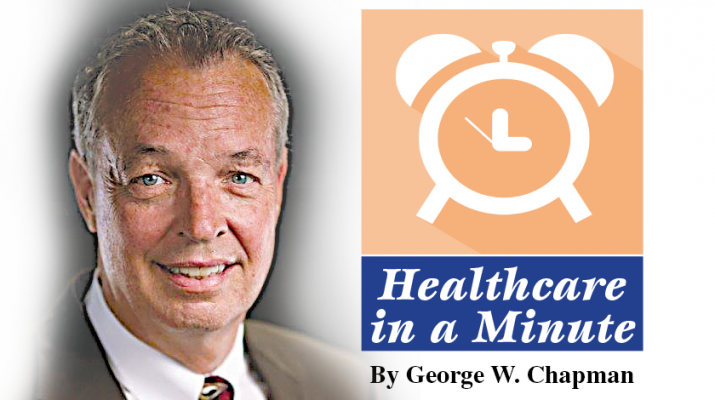Survey Shows Toughest Healthcare Jobs to Fill
By George W. Chapman
Of the top 10 hardest jobs to fill in the U.S., half are in health care, according to CareerCast, which took into consideration Bureau of Labor forecasts, trade association data, graduation rates and their own job listing database. No. 4 is home health aide. No. 6 is medical services manager. No. 7 is nurse practitioner. No. 8 is personal care aide. Coming in at No. 9 is physical therapist.
Top US Hospitals. None from NYS
IBM Watson Health just released its top 100 hospital list. A total of 2,840 hospitals were graded on publically available clinical, operational and patient satisfaction data to create a balanced scorecard. The 100 best hospitals outperformed the rest of the pack in survival rates, complications, infections, length of stay, ED wait times, patient satisfaction and expenses. Ohio led the way with 15 hospitals in the top 100. Texas was second with nine hospitals, followed by third place Illinois with eight hospitals making the top 100. New York state had no hospitals in the top 100.
Value-based medicine
In a move toward paying physicians for outcomes or value versus just plain volume, new Health and Human Services Secretary Alex Azar proposed a four-point plan. 1. Give control of the patient’s record to patients. Poor interoperability among the many electronic record systems out there makes it almost impossible for the patient to have control of their own information. 2. Establish incentives for providers to be more transparent about their fees. Because of higher deductibles and out-of-pocket expenses, consumers are more price-conscious. 3. Use Medicare and Medicaid to drive change. Commercial insurance companies are not getting it done and Azar knows they tend to mimic/follow Medicare’s lead. 4. Reduce regulatory burdens. Frankly, most providers would be thrilled if the government would simply stick to a set of regulations rather than constantly changing them.
Another huge merger
Not to be outdone by the announced but unapproved merger of Aetna and CVS, Cigna has announced it will buy Express Scripts for $67 billion. The companies in both mega mergers are promising more services for consumers at thousands of locations; increased collaboration and coordination of care with providers; and additional opportunities for personalization via data analytics. Insurance companies are aggressively taking matters into their own hands, virtually wresting control away from providers.
Top exercises
Running is tough on both joints and digestive system. The Harvard HealthBeat Newsletter suggests five other types of exercise, three to four days per week, for losing weight, strengthening muscles and improving mental health. 1. Swimming, considered the perfect exercise, for 30-45 minutes per day. 2. Tai chi. 3. Strength training using weights or your own body weight. 4. Walking 30 to 45 minutes. 5. Kegel exercises.
VA in NYS
Veterans are allowed to receive care from community providers when timely care cannot be received from the VA system. But according to a survey of 746 community providers by the RAND Corp, only 2 percent of civilian or private providers say they can accommodate veterans in timely manner. NYS ranks fifth in the number of veterans served. Spending for NYS veterans exceeds $6 billion annually. There are over 900,000 vets living in NYS.
ACA hanging in
Despite repeated attempts to repeal or sabotage the Affordable Care Act, it remains the only viable option for individuals seeking health insurance. A recent poll by the Kaiser Foundation found that 54 percent of us have a favorable view of the ACA. Currently, about 20 million people are covered by the ACA. Seven million purchase private insurance on the exchanges and 13 million people are eligible through Medicaid. Seventy percent of survey respondents feel non-disabled Medicaid recipients should be required to work. Meanwhile, a bipartisan congressional committee is scrambling to stabilize the insurance market that has been disrupted by the repeal of the mandatory requirement to have insurance and the continued uncertainty in the marketplace. Insurance companies have until this summer to decide if they will continue to participate on the exchanges in 2019.
Healthy Cities
WalletHub used 40 metrics to grade US cities on healthy lifestyles. According to them, the top 10 healthiest cities are: No. 1 San Francisco. No. 2 Seattle. No. 3 Portland, Ore. No. 4 San Diego. No. 5 Washington, D.C. No. 6 Burlington, Vt. No. 7 Scottsdale, Ariz. No. 8 Honolulu. No. 9 Irving, Calif. No. 10 Denver. The top 10 unhealthiest cities are: 1. Brownsville, Texas. No. 2 Laredo, Texas. No. 3 Augusta, Ga. No. 4 Shreveport, La. No. 5 Gulfport, Miss. No. 6 Fort Smith, Ark. No. 7 Detroit. No. 8 Jackson, Miss. No. 9 Corpus Christi, Texas. No. 10 Memphis.
Telemedicine/telehealth
Congress has passed a law, whose acronym is CHRONIC, expanding Medicare reimbursement to providers for telemedicine. The committee that drew up the law felt Medicare was far behind when it came to embracing available the technology which will both save money and get critical services to remote rural areas. It is expected that most commercial plans will follow suit.
George W. Chapman is a healthcare business consultant who works exclusively with physicians, hospitals and healthcare organizations. He operates GW Chapman Consulting based in Syracuse. Email him at gwc@gwchapmanconsulting.com.

